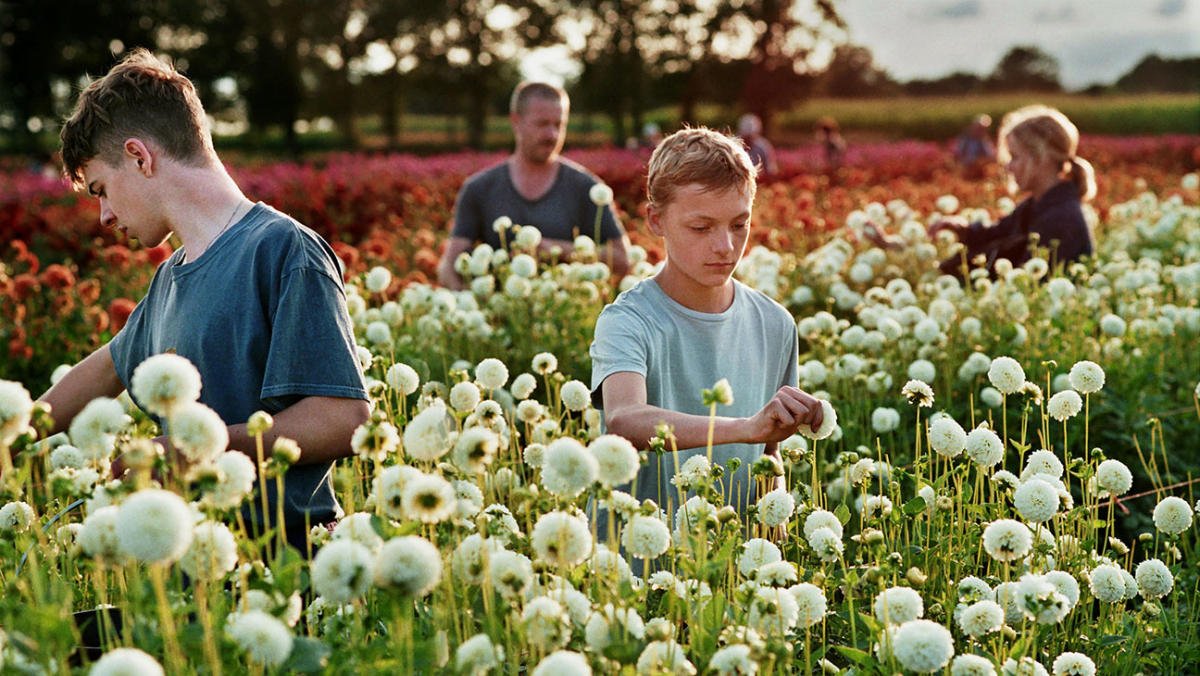Close (2022) Film Review
Close pulses with visual and emotional vibrance. Belgian director Lukas Dhont and co-screenwriter Angelo Tijssens deliver a painful study of connection, friendship, and the fear that can hold us back from them.
**These first six paragraphs proceed relatively spoiler-free**
Léo and Rémi, two 13-year-old boys in Belgium, savour a summer of intimate friendship. When they return to school that fall, the warmth is cooled by the chill of juvenile cruelty. Léo shrinks back at the homophobic insinuations of his peers, and Rémi struggles to understand his best friend’s withdrawal.
The film’s visual palette revels in its Belgian environs: rural, natural, architectural, agricultural, and saturated with vivid colour.
Sparse use of wide shots give Close a sense of intimacy. We routinely linger on the face of a character with a patient fascination that mirrors the more European appreciation for quiet beauty, an attitude present in young Léo’s own fascination with Rémi’s oboe playing.
“The masterful management of pace joined searing patience with staccato momentum.”
The performances of Eden Dambrine (Léo) and Gustav De Waele (Rémi) are at once bouyant and anchored, not once failing to serve a given moment. Dambrine’s own portrayal of Léo’s vacillations between affection and frigidity, enthusiasm and desolation, curiosity and retreat is commanding. De Waele’s soft-eyed and open-hearted steadiness suffuses Rémi with an undeniable purity of heart.
Close (2022)
Similarly impressive are the actors portraying their families, Émile Dequenne, Léa Drucker, Kevin Janssens, Marc Weiss, and Igor van Dessel. Without a weak link in the chain, this ensemble lives up to their nimbly and subtly written characters.
The extraordinary French dialogue is understandably not adequately captured by the English subtitles. Pithy and concise French regrettably balloons at times to English phrases nearly twice the length. But even that hiccough cannot obscure a gorgeous script boasting potently concise dialogue and a purposeful if languid structure.
Valentin Hadjadj’s score plays in flawless synchronicity with the rest of the film. His lush but not overwrought compositions manage to both command attention and vanish entirely in the exact way one would hope. The evocatively placed oboe motifs reward attentive listeners with additional aching reminders of Rémi’s place in Léo’s life.
**The remainder of this review acknowledges various plot events**
Close (2022)
Fraternal affection and how homophobia threatens it are a central motif. Taunts from their classmates and the internalized dread within Léo expose their friendship to injuries from which it does not recover.
The subtext strongly suggests that Léo and Rémi are awakening to a love beyond friendship. By not confirming it explicitly, the film draws audiences into the boys’ own confusion, while also allowing a broader reflection on the lost or impeded friendships between any boys who fear homophobic ridicule.
When grieving the loss of Rémi, Léo finds comfort not only with his parents but also with his brother Charlie and his new friend Baptiste (Léon Bataille). The physical affection he shares with Charlie and his playful camaraderie with Baptiste are all saturated with references to moments he shared with Rémi. But they are free of the possibly erotic tension present with Rémi.
The comparison highlights the intertwined yet distinct relational strands. The boys may share an awakening of new love, but they are also connected in close friendship. Each is its own gift to be relished when shared and grieved when lost.
Close (2022)
Rémi’s death is an excruciating loss. And this is where my feelings are divided toward the film. Close need not have been another homosexual tragedy.
For the first third, it held all the promise of a painful coming-of-age tale building to resolution of Léo’s existential crisis and healing for both boys (not to mention all the wounded souls watching). Another path would have seen Rémi find belonging elsewhere until Léo could recognize the prison his self-protection had erected.
Whether or not the two ever found a way back to each other’s embrace, they could have been instrumental in one another’s discovery of how to love another person… and themselves for that matter.
“[Close] allows a broader reflection on the lost or impeded friendships between any boys who fear homophobic ridicule.”
Dhont’s storytelling acumen would certainly be up to the task of crafting something just as excruciatingly beautiful without Rémi’s tragic end and the mind-bindingly long amount of time Close sustained its sorrow.
Did we need more tragic gay cinema?
But as I said, my feelings are divided. Close is not simply ‘another homosexual tragedy.’ It is an arresting and unavoidable success. Its gut-wrenching misery never tipped into melodrama. The masterful management of pace joined searing patience with staccato momentum and suspended the piece in sadness for a startling length of time without fatiguing my sense of investment.
It was, I believe, the saddest movie I have ever seen.
Its triumph was managing to also be one of the most beautiful.



